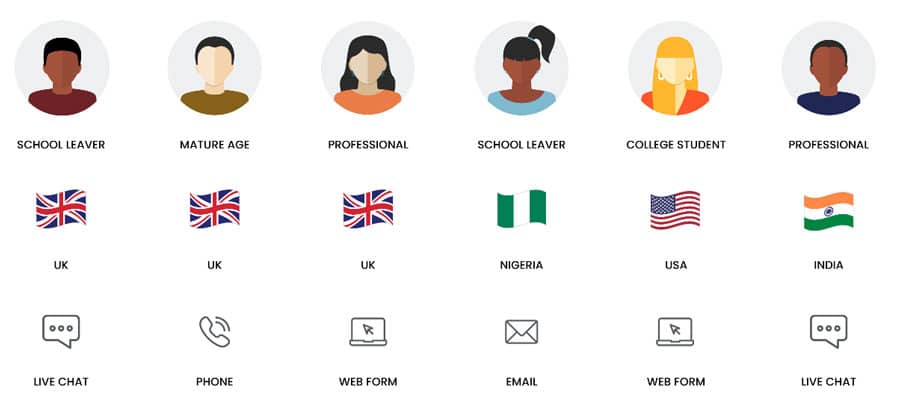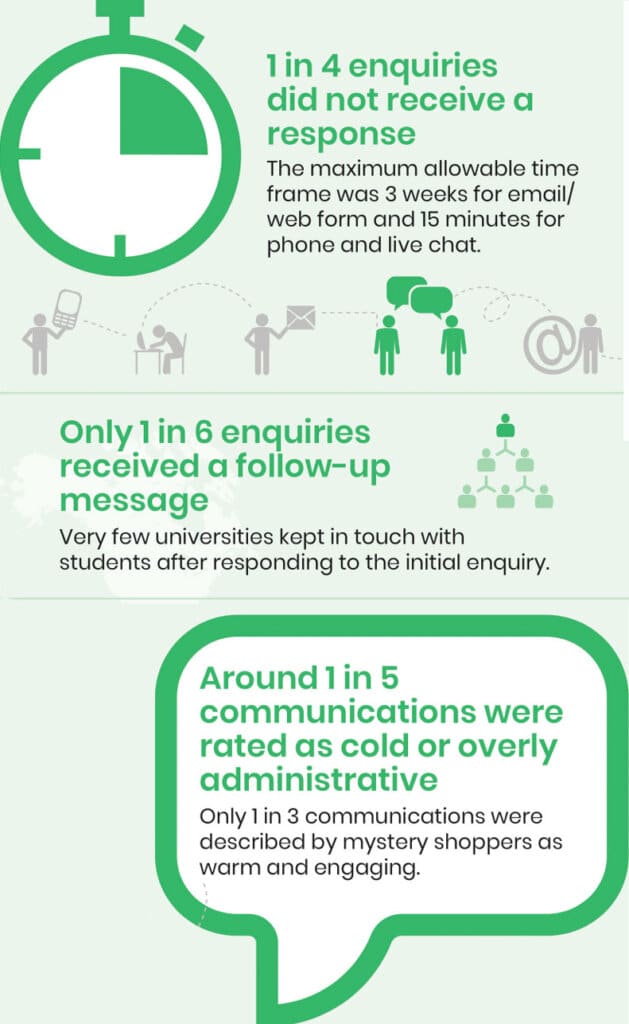Mystery shopping study highlights “lost opportunity” for enquiry conversion
- During a recent study, in which mystery shoppers posed as prospective students, one in four received no reply at all to their enquiries to UK universities
- Only one in six received any sort of follow-up contact after the university’s initial response
A new mystery shopping study offers some important findings for recruitment marketers with respect to managing and converting enquiries from prospective students. Conducted earlier this year by UniQuest and industry consultancy Edified, the study saw mystery shoppers place enquiries with 54 UK universities (which represents about 40% of all higher education institutions in the country).
The enquiries were placed for six carefully defined student personas, including three prospective international students (as illustrated below), and across four enquiry channels: live chat, phone, web form, and email. Speaking during a recent webinar that presented the research findings, UniQuest Chair & Co-founder Natalie Letcher set the context for the study by noting that, "A great enquiry experience supports conversion."
She explained that, based on UniQuest tracking across 1.2 million student files over the past several years, those who enquire before applying make up 17% of all enrolments. That same data set indicates clearly that students who get "a great enquiry experience convert from offer to enrolment at more than twice the rate of others."

Many go unanswered
Also on the webinar, Edified's Elissa Newall explained the methodology for the study, noting that enquiry responses were scored for ease of access in making the enquiry in the first place (and the range of options available to students) and then by quality of communication, the timeliness of the response, and whether or not the student received any follow-up communications from the university.
The study allowed a maximum response time of three weeks for email or web form enquiries, and up to 15 minutes for queries filed via live chat or phone during UK business hours.
The average response score across the entire study was 57 out of maximum possible score of 100, with most universities scoring between 40 and 70 points. Most institutions scored well for the range of enquiry options available but less so for responsiveness and follow-up.
The headline findings in this respect are that:
- One in four enquiries received no response at all
- Only one in six received a follow-up contact from the university
"That's a bit of a lost opportunity there if you're thinking in terms of lead nurturing and converting enquiries further down the pipeline," said Ms Newall.

The changing mix of enquiry channels
She added that while traditional enquiry channels – phone and email and web forms – were offered by all universities contacted during the study, live chat and peer-to-peer options are now commonplace among UK institutions. More than half of the universities in the study offered a live chat option and nearly all (80%) have a peer-to-peer service, whether that is proprietary to the institution or provided via a third-party service such as Unibuddy or The Ambassador Platform.
Broader UniQuest data from 2020 indicates that live chat was the fastest-growing enquiry channel for Indian students that year. The mystery shopper study, however, found issues with the technical function of some live chat services (notably, compatibility with mobile devices) as well as quality and depth of live chat responses.
"Every communication with a student is a chance to position your university and form a relationship," said Ms Newall. "We tended to find that [live chat] responses back from universities were factual and focused on transferring information. But around one fifth of communications, [could be described] as cold in the language, in the feeling, and in the way they were written. Only one in three were described by our mystery shoppers as having a warm and engaging feeling."
Best practices for fielding enquiries
The study also highlighted a number of good practice examples, noting especially cases where prospective students received immediate, automated responses that were both engaging and detailed (for example, offering a virtual campus tour alongside key sales points for the institution) and which were then followed by more tailored responses that combined warmth with personalised detail targeted to the enquiry (and with further follow-up contacts afterward).
Some immediate takeaways from the research in terms of best practices for enquiry management include:
- Track response times across channels and student types, and set specific targets for responsiveness and follow-up. "But if you don't have the data it's very hard to see if there is an issue there," said Ms Newall.
- Clearly communicate the benefits of studying with your university
- Explore new, fast-growing channels such as live web chat and mobile messaging
- Set a target for a further follow-up with prospective students within five days of their initial enquiry
For additional background, please see:
















